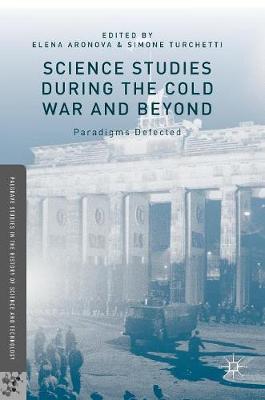Overview
This book examines the ways in which studies of science intertwined with Cold War politics, in both familiar and less familiar “battlefields” of the Cold War. Taken together, the essays highlight two primary roles for science studies as a new field of expertise institutionalized during the Cold War in different political regimes. Firstly, science studies played a political role in cultural Cold War in sustaining as well as destabilizing political ideologies in different political and national contexts. Secondly, it was an instrument of science policies in the early Cold War: the studies of science were promoted as the underpinning for the national policies framed with regard to both global geopolitics and local national priorities. As this book demonstrates, however, the wider we cast our net, extending our histories beyond the more researched developments in the Anglophone West, the more complex and ambivalent both the “science studies” and “the Cold War” become outside these more familiar spaces. The national stories collected in this book may appear incommensurable with what we know as science studies today, but these stories present a vantage point from which to pluralize some of the visions that were constitutive to the construction of “Cold War” as a juxtaposition of the liberal democracies in the “West” and the communist “East.”
Full Product Details
Author: Elena Aronova , Simone Turchetti
Publisher: Palgrave Macmillan
Imprint: Palgrave Macmillan
Edition: 1st ed. 2016
Dimensions:
Width: 14.80cm
, Height: 2.40cm
, Length: 21.00cm
Weight: 5.459kg
ISBN: 9781137578167
ISBN 10: 1137578165
Pages: 328
Publication Date: 26 September 2016
Audience:
General/trade
,
General
Format: Hardback
Publisher's Status: Active
Availability: Manufactured on demand 
We will order this item for you from a manufactured on demand supplier.
Table of Contents
.Section one. Science Studies in the “West”.-.Chapter 1. George Reisch, Telegrams and Paradigms: On Cold-War Geopolitics and The Structure of Scientific Revolutions.-.Chapter 2. Ian James Kidd, “What’s So Great about Science?” Feyerabend on Science, Ideology, and the Cold War.-Chapter 3. Simone Turchetti, Looking for the Bad Teachers. Radicalism and the history of science in Western countries.-.Chapter 4. Hans-Joachim Dahms, Kuhn’s “Structure”: An Exemplary Document of the Cold War Era?.-. Section two. Studies of Science Behind the ‘Curtain’.-.Chapter 5. Gabor Pallo, Blind Isolation: History of Science behind the Iron Curtain.-.Chapter 6. Michał Kokowski, The Science of Science (naukoznawstwo) in Poland. Defending and removing the past in the Cold War.-.Chapter 7. Vítězslav Sommer, Scientists of the World, Unite! Radovan Richta’s Theory of Scientific and Technological Revolution.-. Section three. National Agendas of the Studies of Science Beyond the ‘Two Blocs’.-.Chapter 8. Aant Elzinga, Cold War and Academic Boundaries: Imprints on the origins and early development of science studies in Sweden.-.Chapter 9. Federico Vasen, What Does a “National” Science Mean? Science policy, politics and philosophy in Latin America.-.Chapter 10. Lu Gao, From Natural Dialectics to STS: The Historical Evolution of Science Studies in China.
Reviews
`Science Studies during the Cold War and Beyond' provides an occasion for self-reflection where the contours of institutional geography and intellectual hierarchies gain salience, personalities and intellectual identities interlock, and the stories that one may hear at a conference dinner table turn into historiographical questions relevant beyond the confines of our community. This alone is a reason enough to make the volume a must-read for all STS scholars and to attract a broader audience. (Ksenia Tatarchenko, H-Soz-Kult, hsozkult.de, October, 2017)
Author Information
Elena Aronova is an Assistant Professor at the History Department of the University of California at Santa Barbara, USA. She is completing her book, which examines the ways in which ideas about science have become a sphere of Cold War competition, on both sides of the “iron curtain.” Her current project, Doing Things with Data, examines the politics of environmental data collection, archiving, and exchange during the Cold War. Simone Turchetti is Lecturer at the Centre for the History of Science, Technology and Medicine at the University of Manchester, UK. His research focuses on the interplay between scientists, intelligence officers and diplomats during the Cold War period. He is the author of The Pontecorvo Affair: A Cold War Defection and Nuclear Physics (2012), and more recently he has co-edited The Surveillance Imperative. Geosciences during the Cold War and Beyond.
Tab Content 6
Author Website:
Customer Reviews
Recent Reviews
No review item found!
Add your own review!
Countries Available
All regions
|




